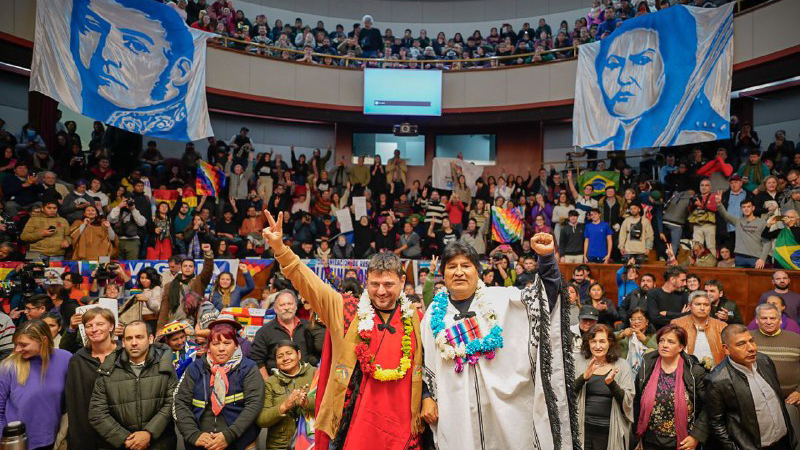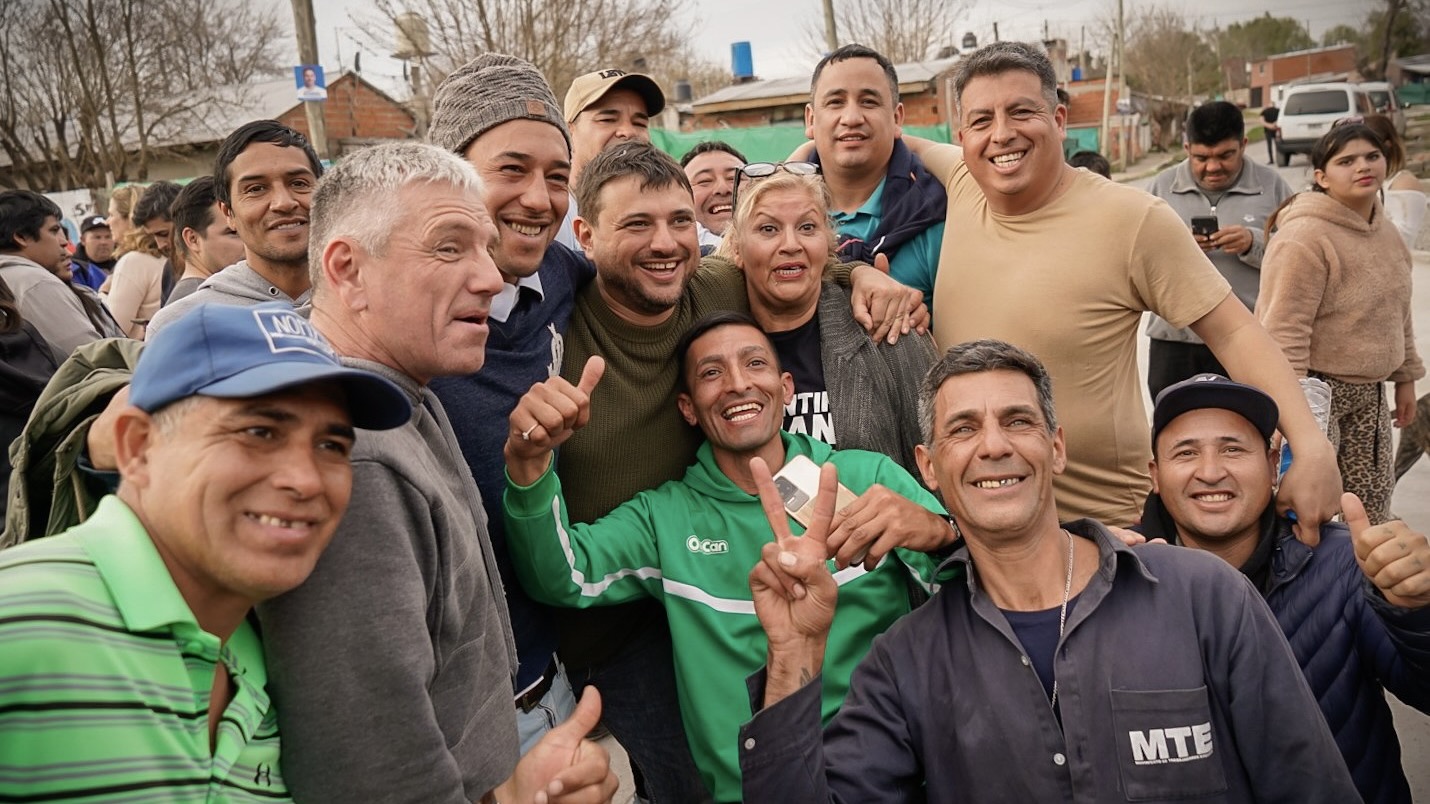Presidential pre-candidate Juan Grabois was 18 years old when he was first arrested by state forces for participating in a protest. It was 2002. Over 50% of the population of Argentina was living below the poverty line and the value of the Argentine peso had plummeted. Tens of thousands of Argentinians were on the streets demanding that the government take immediate action to address the economic crisis in the country. People from the most marginalized sectors of the working class, who had been forced into the informal sector, fired from their full time jobs, or were unable to find any work, organized the famous pickets, “corte de ruta” (cutting the street), on major highways and bridges. They were known as the “excluded” or “unoccupied” workers.
These workers did more than block the roads. They pooled together resources to organize community kitchens to feed the thousands of people suffering from food insecurity, ran schools to help community members get their secondary school certificates, and began to organize productive activities, such as recycling cardboard (the cartoneros), textile projects, and reactivating production in abandoned factories, in order to to generate income for their communities.
These diverse initiatives of what came to be called the piquetero movement became permanent practices of the country’s mass movements and were strengthened by the arrival of the Nestor Kirchner government which ended the period of immense political instability (five presidents in two weeks) and incorporated many of the movement’s proposals into its policies and programs. The mass movements which exist in Argentina today were forged in this period, including the Dario Santillán Popular Front, the Evita Movement, Barrios de Pie Movement, and many others. In this period, the young social activist and student Juan Grabois, along with workers in the informal sector such as street vendors and cartoneros, founded the Movement of Excluded Workers (MTE).
Today, tens of thousands of workers from the “popular economy” are organized under the banner of the MTE, which Grabois continues to lead. It defines itself as an organization that brings together “people who were discarded from the formal labor market as a result of the neoliberal model.” These workers “invented our own work in the popular economy to survive and we found in the popular organization a way to dignify our work and our living conditions.” The organization works in the areas of textile production, construction, public spaces, cartoneros, economic support to people recently freed from prison, rural workers, and people suffering and recovering from addiction.
The organization fights for a dignified life in the present and for guaranteeing three basic rights: land, housing, work; in Spanish, the “three Ts” (tierra, techo, trabajo). It is this perspective and this commitment to transformation that has led Grabois to stand for presidency in 2023.
Since the birth of MTE in the early 2000s, Argentina has gone through many transformations. The country made a remarkable recovery under the governments of Nestor Kirchner and his partner and successor, Cristina Fernández de Kirchner. It was able to fully pay back its debt to the International Monetary Fund (IMF), stabilize the currency, and register consistent economic growth. The poverty rate dropped from over 50% in 2002 to 27% in 2014.
In 2015, conservative politician Mauricio Macri was victorious in the presidential elections. During his four years in office, he followed a neoliberal economic model and implemented hardline austerity policies, cutting major services, programs, and even ministries, while indebting the country through taking out bonds and an extremely controversial USD 50 billion loan from the IMF in 2018.
At the time, Gonzalo Armúa of Frente Patria Grande told Peoples Dispatch, “The IMF has returned hand-in-hand with the current government of Mauricio Macri, a government that can be characterized as openly neoliberal even as across the world, the perils of neoliberal globalization are being hotly discussed.”
He had pointed out, “Mauricio Macri has been putting the country in debt since the beginning of his government. It is important to point out that Argentina, when Macri first came to power, had become economically stable. It did not have significant external debt. The debt generated by the government of Macri is in order to serve its own interests and pay prior debts made by itself.”
Much like in 2002, Argentina once again found itself in an untenable economic crisis. By the time Macri left office, over 40% of the Argentine population was living below the poverty line, unemployment had increased by more than 10%, and the Argentine peso’s value had declined by 566% from when Macri took office in December 2015.
While much hope was vested in the Frente de Todos government led by Alberto Fernández, the impact of the USD 50 billion IMF loan and the debt negotiations, the COVID-19 pandemic and severe economic recession, as well as the already serious socio-economic catastrophe inherited from Macri, meant that despite important advances led by the FdT government, full recovery has been slow. In 2022, Argentina recorded 100% inflation and the poverty level hovers around 40%. Fernández himself announced that he would not seek reelection.
Primaries
Today, Fernández’s rebranded progressive coalition, Unión por la Patria (Union for the Homeland), is heading to the polls with a similar mandate: rebuild Argentina’s economy, defend basic rights, and build key strategic partnerships outside the western paradigms. The coalition is headed to the primaries (PASO) on August 13, and over 35 million Argentines will go to the polls to elect the candidates who will stand in the upcoming presidential elections on October 22.
In the primary elections, the voters will cast a ballot in favor of any one candidate they please, regardless of their party affiliation. The coalitions with more than one presidential ticket use these elections to decide who will represent them in the general elections.
The primaries for the Unión por la Patria coalition will see a contest between the current Minister of Economy Sergio Massa, Chief of the Cabinet of Ministers Agustín Rossi, and Grabois whose running mate is social activist Paula Abal Medina.
For the movement leader Grabois, winning the Unión por la Patria ticket is clearly an uphill battle, especially since the Massa-Rossi ticket has already been endorsed by Cristina Fernández. However, Grabois has stated that the primary elections serve as an opportunity to bring the agenda of the popular sectors to the table, gain mass support for these proposals – his campaign has already achieved key endorsements nationally and internationally – and “condition” the political system.

In this process, he has proposed a Comprehensive Development Plan for a Humane and Federal Argentina. It has been developed on the basis of his visits to different provinces during 2022 and the years of organizing with the MTE and the umbrella organization it is part of, the Union of Workers of the Popular Economy (UTEP). The plan is divided into eight key areas: housing, debt, energy sovereignty, education, inflation, security, work and equality.
“The political agenda that we promote is clear: Land, Housing, Work, Health and Education. Therefore, our participation in party politics was always based on proposals… During the pandemic, together with trade unions and popular movements, we began promoting an Integral Human Development Plan with proposals for the post-pandemic period… our political proposal is that Argentina must recover the capacity to plan the future that neoliberalism stole from us,” said the Grabois-Abal ticket, announcing their government proposals on the official website.
Here are the details of Grabois’ humane plan for Argentina:
Housing
Grabois has promised to create one million housing areas and provide them to the vulnerable population to build their houses. In addition, he has proposed to increase the supply of rental housing by imposing a tax on idle houses, as well as working to ensure availability of apartments for social rental housing.
He has also vowed to initiate socio-urban integration works in the 5,687 popular neighborhoods, and revitalize small towns with the necessary services for those who want to live further from the city.
Debt
With regard to Argentina’s USD 44 billion loan with the International Monetary Fund (IMF), the candidate has proposed to cancel the current agreement with the agency, and recover sovereignty over the economy. He has suggested waging an international battle against the organization to oblige it to recognize its responsibility in the bad implementation of the loan and negotiate better repayment conditions. He has also proposed to execute a plan that allows the country to grow and redistribute its wealth without interference from the IMF.
Energy sovereignty
Grabois has pledged to nationalize the country’s lithium resources and produce value-added products in Argentina. He also plans to create a Sovereign Lithium Fund with the money collected and dedicate it exclusively to finance the public education sector.
He has also vowed to establish sovereignty over strategic resources such as water, lithium and other minerals found in the country, fuels and green energy, and food, by adopting the model of the state-owned energy company YPF, where the capital is invested by a number of shareholders but the State owns 51% of the shares.
Education
Concerning the public education sector, the social leader has proposed to develop a National Plan for Literacy and School Re-engagement to ensure that all children return to school and learn how to read and write.
He has also pledged to prioritize teachers’ training and work by granting scholarships, recognize time devoted in planning classes, and give salary bonuses to those who work in poor neighborhoods.
He has also vowed to improve school infrastructure, provide nutritious food, upgrade internet connection, and equip all primary and secondary schools with computer labs.
Inflation
To face the tremendous challenge that hits the pocket of each and every Argentine, Grabois has proposed a series of measures in the local as well as macroeconomic context. He has affirmed support to the proposal of Brazil and Argentina to create a new currency for South America called “South Currency,” to achieve greater strength, stability and independence from the dollar.
To deal with food inflation, he plans to create a national company that packs and sells at affordable prices the products constituting the basic food basket produced by regional SMEs, which today lack sufficient capital to reach supermarkets.
Along the same lines, he has declared he will promote protection of the fruit and vegetable producing regions to guarantee the production of fruits and vegetables near the cities, reduce logistics costs and eliminate intermediaries in the marketing chain.
Security
In the area of security, Grabois has proposed the creation of an anti-recidivism plan with a guaranteed minimum job for everyone who is about to be released from prison, as well as an anti-bullying program in schools to prevent school dropouts.
He has also promised to reform the police by improving their training, eradicating corruption in the department, and caring for the mental well-being of the force.
He has also pledged to implement a system to control and socially reuse the assets seized from drug trafficking, corruption, human trafficking and organized crime.
Work
Referring to work, Grabois has proposed to create a legal contingency insurance for SMEs. With the motto of “Work with rights for all,” he has proposed to introduce a special regime for SMEs and single-employer companies to guarantee Christmas bonuses, social security, union wages, paid vacations and sick leave for workers. He has also proposed to create a solidarity compensatory fund for large companies, and implement a universal basic wage and minimum guaranteed work regime.
Equality
In relation to achieving greater equality in Argentina, Grabois has promised to implement a system that ensures permanent contribution of large fortunes. He has also vowed to reduce taxes on consumption and production by SMEs, as well as eliminate the privileges for judges and powerful people.
—
August 13 will be the first hurdle for presidential hopefuls who have all vowed to change the situation in the country (albeit with vastly different proposals). The country’s general elections will be held on October 22 and the second round, if necessary, will be held on November 19.





